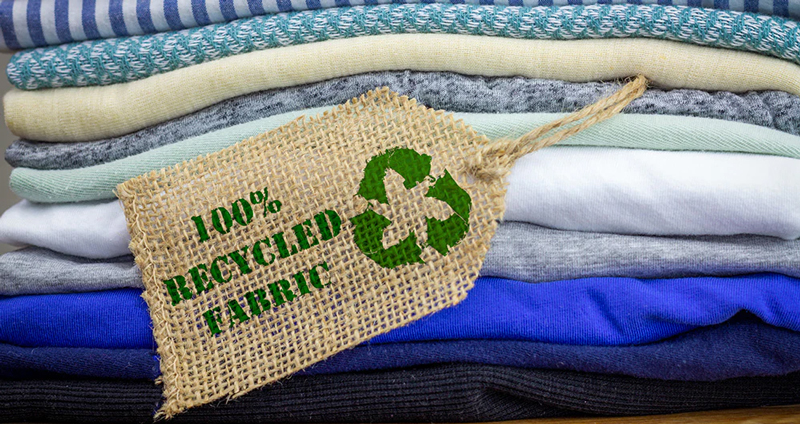Future Development Trend Of Textile Industry – Eco Friendly Recycled Fabrics
Published On: April 19, 2024 By: ray herb

As people become more passionate about sustainable development, demand has skyrocketed for green and circular fiber products like recycled fabrics worldwide and domestically.
Ⅰ. What is Recycled Fabric?
Recycled fabric is an environmentally-friendly fabric solution. Recycled nonwoven fabrics made of recycled PET (Recycling Plastic Empty Thermoplastic Elastomers), such as used mineral water bottles or Coca-Cola bottles are known as recycled PET fabrics (RPET fabrics) which has become very popular worldwide, particularly within developed nations in Europe and North America.
Recycled polyester fabric (RPET fabric), also referred to as recycled PET bottles or fibers recycled back into PET bottles is one way of recycling plastic that reduces dependence on oil resources while simultaneously cutting emissions of greenhouse gasses into the atmosphere. Today PET bottle fibers recycled back into fabric textiles have become widespread.

Recycled polyester fabrics can save nearly 80% of energy used during their production processes, leading to significant fuel savings and reduced greenhouse gases emissions. Statistics demonstrate that producing one ton of recycled polyester yarn saves one tonne of oil and six tons of water; as a result, using recycled polyester fabric contributes positively towards China’s low-carbon emission reduction and sustainable development plan.
Recycled PET fabric (RPET) is an environmentally-friendly recycled fabric whose yarns are extracted from used mineral water bottles and Coca-Cola bottles that have been collected as waste; hence its alternative name Coca-Cola bottle recycling fabric (RPET). As this waste recycling product has high preference abroad – particularly among developed nations in Europe and America – for luggage, home textiles and clothing applications; with one ton saved per ton saving energy usage with obvious environmental advantages as an environmental benefit. Recyclable fabrics also reduce petroleum consumption saving 6 tons annually with significant environmental advantages over time!
II. Characteristics of recycled fabrics
1. Recycled fabrics can reduce the use of petroleum. Every ton of recycled fabrics (RPET) used can save 6 tons of petroleum, which contributes to environmental protection unconsciously.
2. One plastic bottle = reduce carbon emissions by 25.2g = save fuel by 0.52cc = save water by 88.6cc
This environmentally friendly yarn has passed the internationally recognized GRS certification for recyclability and the authoritative certification of the US SCS Environmental Protection Agency, so it has a high degree of international recognition.

III. Uses of recycled fabrics
1. Industrial products: climbing bags, satchels, schoolbags, computer bags, trolley cases, travel cases, shopping bags, handbags, gift bags, storage boxes, ice packs, medical bags, etc;
2. Clothing: down (cold-proof) clothing, windbreaker, jacket, beach pants, swimsuit, anti-static workwear, fashion, pajamas, sportswear, etc
Home textiles: bed sets, blankets, toys, fashionable chair covers, aprons, umbrellas, curtains, tablecloths for western restaurants, baby strollers, etc;
3. Miscellaneous: tents, sleeping bags, hat materials, shoe materials, car accessories, etc.
